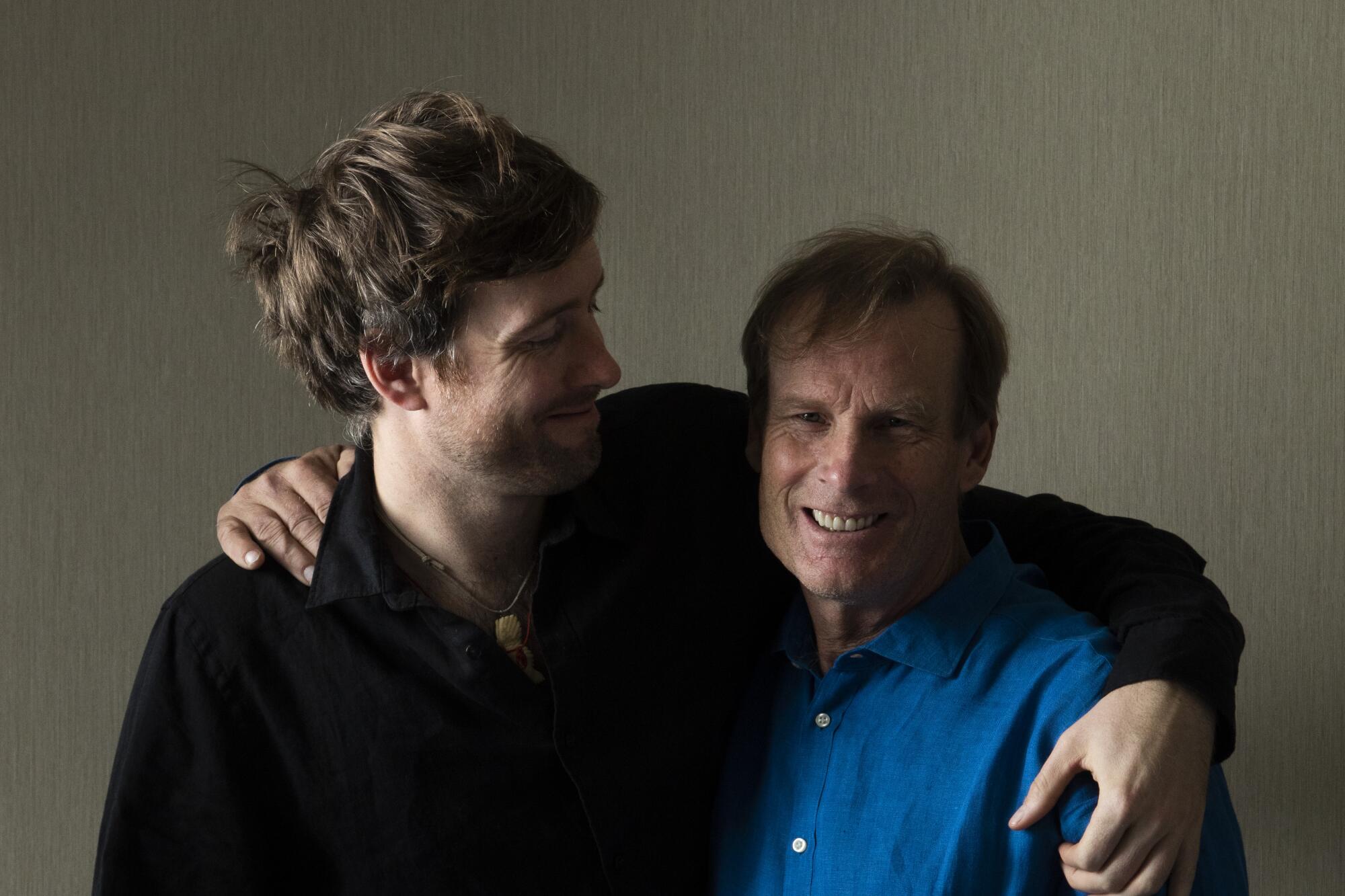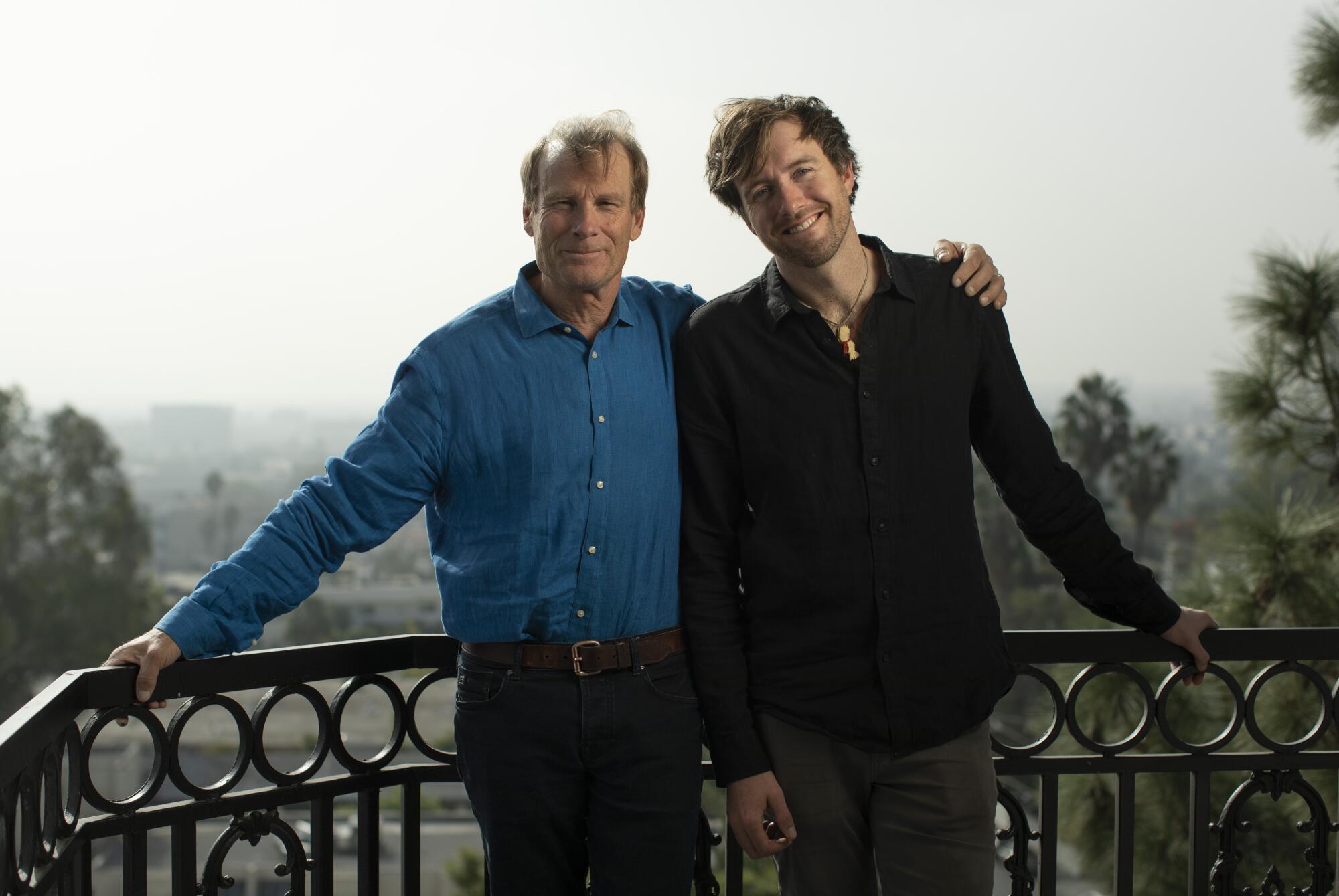
- Share via
For years after the avalanche, Max Lowe still believed his father might come home.
After all, his dad’s body had yet to be recovered from Shishapangma, the 26,289-foot peak he’d traveled to the Himalayas to ski down. Alex Lowe was a renowned mountaineer — a member of the North Face professional climbing team who’d summited Everest twice and appeared on the cover of Outside magazine. Maybe the rescue team had failed to find him miraculously alive in a crevasse.
And then there was the birthday card. Alex had painted it for his son during the expedition, just days before he was enveloped by a 500-foot-wide cascade of snow. When it arrived in the mail at the Lowes’ home in Montana — shortly after the disaster in Tibet — 10-year-old Max saw it as a sort of talisman.
More so than his brothers, who were just 3 and 7 when Alex went missing in October 1999, Max clung to his father’s memory. When their mother remarried a year and a half later, he was the only one to keep Lowe as his last name. In fact, it wasn’t until 2016 — when news came that Alex’s remains had been found by a climber — that Max would really begin grappling with his relationship to his dad.
That’s ostensibly what “Torn,” the documentary he would go on to make, is about: a son trying to get to know the father he didn’t get enough time with. But the film, released theatrically by National Geographic this month and on Disney+ in early 2022, is also about the dad Max gained when he lost Alex. That’s Conrad Anker, who also happened to be Alex’s climbing partner and best friend. He was on Shishapangma with Alex, and was the one who called the Lowes to tell them about the avalanche.
“Making this film, in part, was something I wanted to do for Conrad,” said Max, now 33. “To paint a picture of Alex more resolutely, that speaks to his flaws and tells a story we can relate to more.”
The filmmaker was seated beside Anker at a vegan restaurant in Los Angeles, a carving of a snowy owl hanging around his neck. They were in town from Bozeman, Mont., where Max lives in a house across the street from Anker and his mother, Jenni Lowe-Anker. Both men are the strong, silent type, less interested in ruminating on their feelings than churning forward with a positive attitude. “Torn,” however, would require facing such uncomfortable conversations head on. And at first, Anker was reluctant.
“He wasn’t real keen on it at first,” admitted Lowe-Anker. “He’s not a guy who wears his emotions on his sleeve. It was really hard for him to think of dragging all that pain back out, and especially doing it on camera. But we talked about it and said: ‘This is Max’s journey. This is our son.’”
At 59, Anker has spent the majority of his life in the public eye. He skyrocketed to fame in 1999, after discovering George Mallory’s remains on Everest. At the same time, he said he and Alex had become “the standard-bearers for alpine climbing,” trailed by camera crews on their trips and giving keynotes at outdoor trade shows. And after Alex’s death, Anker continued to cement his reputation as one of the world’s most accomplished athletes, tackling dozens of risky and remote summits. He was one of the central figures in “Meru,” a 2015 documentary in which he and filmmaker Jimmy Chin attempt the first ascent of a dangerous route on a Himalayan peak. He even survived a heart attack that hit while midclimb at 20,000 feet — an incident that would cause him to retire from high-altitude mountaineering.
The heart attack occurred in 2016, the same year Alex’s body was found. Anker, Lowe-Anker and their three boys decided to travel to Tibet together to retrieve the remains. The endeavor required a massive logistical effort: obtaining special entry visas, securing a police escort, buying body bags and stretchers.
Not knowing if he’d ever use the footage, Max — who’d made short documentaries and branded content for companies such as REI and Red Bull — sought his family’s permission to film the journey on a handheld camera. The level of emotion he captured surprised everyone.
“It was the first time I could see how much Conrad was still dealing with the survivor’s guilt around Alex’s death, and imposter syndrome,” said Max.
“That pain is physical,” said Anker. “And then the PTSD of going there and attending to the bodies. It’s like, there’s my water bottle in his day pack with my handwriting on it, with water I put in there 16 ½ years ago.”
Back in Montana, Max began unpacking his own response to the trip. A friend who ran a local ideas summit asked if he’d give a presentation about the journey, and onstage, Max broke down crying. He realized he’d gained access to a new level of vulnerability he’d never explored and decided to ask his family “to step up and come to the table” for full-fledged interviews about Alex’s death.
Still, Max was particularly anxious about his one-on-one with Anker.
“For whatever reason, we have never really been able to talk about stuff with a level of intimacy,” Max said, shifting in his seat. He paused. “Did you and Mom ever talk about going to family therapy with all of us to talk about any of this?”
“No,” Anker answered without hesitation. “We kept busy, and we lived life. The kids were in school. I was still working as a professional athlete. And that was our therapy, in a sense — not sitting around or anything like this. … We didn’t feel a need to say, ‘Well, we got to work through this.’ Life was good.”
That was the ethos Max absorbed, too: Manage the chaos. Maintain forward motion. As a teenager, he said he was reluctant to broach the sensitive subject matter for fear of “rocking the boat.” In 2007, when his mother published a memoir about her life with Alex, Max couldn’t get through it.
“I hid a lot of those feelings,” he acknowledged.
But as it would turn out, the camera allowed Max the freedom to ask the questions he’d buried for so long. In return, his relatives met him with a newfound level of candor. Anker opened up about the pressure he felt to fill Alex’s shoes and live up to the “good guy” ideal the public assigned him after he adopted the boys. Lowe-Anker read aloud from intimate love letters written to her by both of her husbands. In one of the notes, sent just a month after Alex’s death in 1999, Anker wrote:
There is hardly a moment that the four of you are not in my thoughts. At times, it is difficult for me. I cry myself to sleep, waking up grinding my teeth with very dark thoughts. I gather strength knowing that you are there. You and the boys are the ones I want to help and care for. To be there for the boys as they mature into little men and become men is something I hope to do.
“That really hit me,” Max said of the note, which brought him to tears in the film. “I hadn’t ever thought about it that way, that he wanted to be there for us more than anything else. Not that he didn’t want to be there for my mom. But for me and my brothers in this deep, emotional sense. I opened myself up to that.”

The revelation prompted Max to express his love for Anker on camera. To say thank you for stepping in. To tell him that no one could have done a better job. To say he considers Anker “Dad.”
“For Max, it was like trying to convince Conrad he’s not just holding Alex as someone he’s loyal to. ‘You’re my dad and I love you,’” said Lowe-Anker. “It’s probably deepened their relationship.”
It’s not that Max had never told Anker he loved him. He did that for the first time on the inaugural Father’s Day they spent together. Max gave Anker a large box containing a stash of smaller boxes. Inside the smallest one was a card: “I love you.”
But “Torn” was a different kind of gift.
“It’s a tribute from Max of his love for me,” Anker said. “I’m very grateful for that, and I recognize it. It took a lot.”
More to Read
Only good movies
Get the Indie Focus newsletter, Mark Olsen's weekly guide to the world of cinema.
You may occasionally receive promotional content from the Los Angeles Times.











